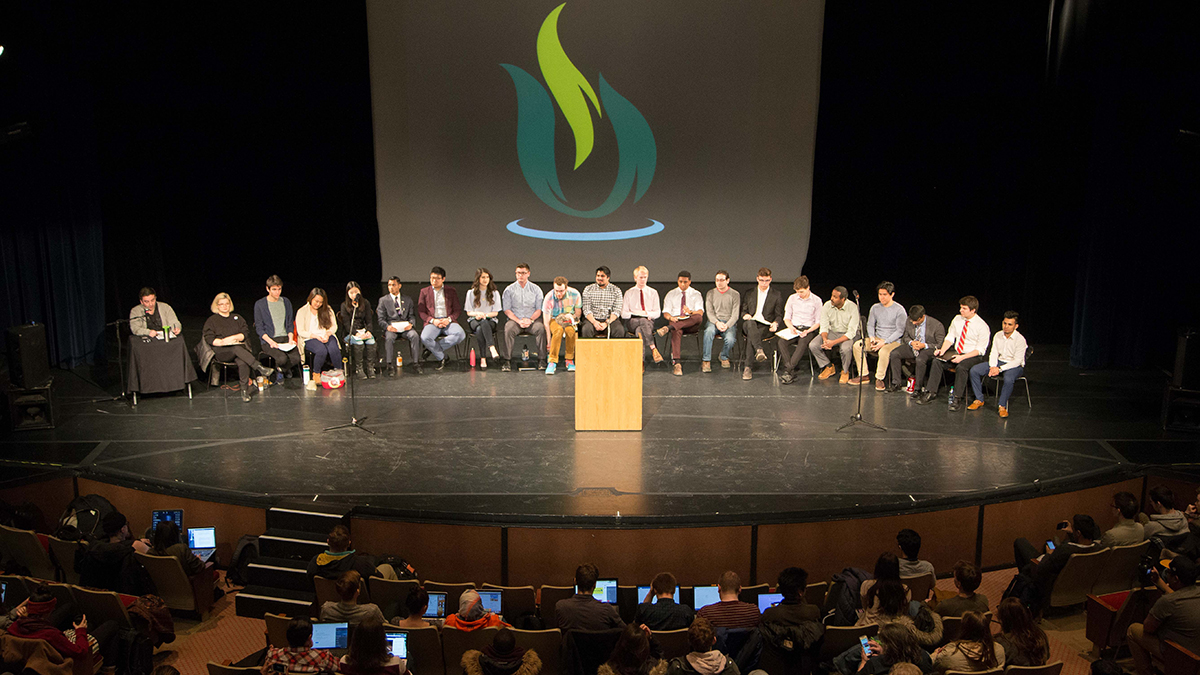 Joshua Storie
Joshua StorieBefore casting your vote on March 8 or 9, ask yourself what you want from a Students’ Union president.
To me, a Students’ Union president should represent the vast majority of the student body. This element may not be the be all and end all for you, and I’m not trying to convince you that it should be. Marina Banister, Bashir Mohamed, and Donut the Cat all have different campaign promises and all represent a different group of students (and species) at the university, so I encourage you to educate yourself on the candidates’ platforms, visit their websites, and vote for the one who makes the most sense for you. For me, that’s not Banister.
Banister’s face is everywhere on posters in quad and plastered on walls in buildings across campus, so she’s definitely the most visible presidential candidate. Especially for those who are not actually following the forums and the campaign, they’ll probably vote for Banister simply because they’ve seen her face everywhere, which is a great branding and marketing strategy on Banister’s end. In addition, she has a lot of the SU vote. Students are endorsing Banister and posting smiling photos on Facebook with descriptions explaining why she has their votes. She has a successful track record with projects like the Interdisciplinary Conference and GovWeek, events she ran this past year as Vice-President (Academic). She’s well-spoken, knowledgeable, and confident in the forums. She can come across as a career politician due to her preparedness, which can be a positive thing, but for me, this career politician demeanor is what makes her seem “emotionless,” as she mentioned, disingenuous, and not very personable. As a result of this disconnect, she doesn’t seem to represent the whole student body in my eyes, and that’s why I don’t feel comfortable giving her my vote.
I also think it’s unrealistic to suggest that the presidential race is about the candidates’ platforms. Let’s be honest, it’s a popularity contest. But if the race was about platform points and campaign promises, I’d pay attention to Mohamed’s. Most notably, Mohamed is advocating for more affordable and accessible post-secondary tuition. He’s mentioned numerous times that he comes from a low-income family who sought refuge from Somalia and he’s said he’s the only presidential candidate paying his own tuition. Although lowering tuition may not be a realistic promise, I don’t think that’s a viable reason to not cast a vote for Mohamed. If he fails, he fails. But at least he’s willing to try. One of Mohamed’s points is bettering the wait time and cost for child care. Although this point may not pertain to everyone on campus (it doesn’t affect me personally) those who it will affect will benefit greatly from changes to child care services. Another promise is to improve affordability and financial supports available to international students. Again, I’m not an international student, so this point does not affect me directly. But for the over 5,000 undergraduate international students, this would be a huge win. Personally, I think the magnitude of such benefits is preferable to a thin promise across a larger sample of students.
On the other hand, three highlights of Banister’s campaign include external advocacy both in terms of making Edmonton “a better place to learn and thrive” and also advocating for affordable tuition, although such promise doesn’t seem to be as dire as it is in Mohamed’s campaign; improving mental health supports (especially for indigenous, international, and LGBTQ+ students) and inclusivity on campus (in student governance); and working on a Student Charter of Rights, which seems to be an unnecessary attempt to mildly impact all students on campus (Mohamed also thinks this promise is a waste of time and resources). Banister, however, has a more feasible plan than Mohamed for implementing a potential mandatory native studies course and, as a privileged “white settler” (like myself), she recognizes the importance of educating students about indigenous history. Instead of slapping the same native studies requirement onto every degree, it would be adaptable, and hopefully implemented on a departmental level rather than a faculty one.
In the Peter Lougheed Leadership Collage forum, Banister expressed that the “number one” aspect of being SU president is working in a team with her fellow executives, which is important, but not the most important. She’s an organized and well-spoken candidate, she’s determined, she’s proven to be successful as VP (Academic) this past year, and she is the popular choice. For those reasons, I believe she will win the presidential race. But it’s hard to ignore Mohamed’s campaign and presence in the forums. Although it took him a few forums to warm up, he successfully conveyed an anti-establishment position, which directly opposes Banister. And although many of his promises may seem unrealistic or too ambitious, it would be a mistake to ignore his promises for these reasons. He’s willing to disrupt the status quo that is the SU (and thereby Banister) and favours taking risks in order to make changes. For those who are wanting to see change happen, Mohamed is your candidate. And, of course, for those who really don’t care about the SU election or want to cast a sort of protest vote to make a statement, Donut the Cat and her realistic feline platform points may win your vote.




